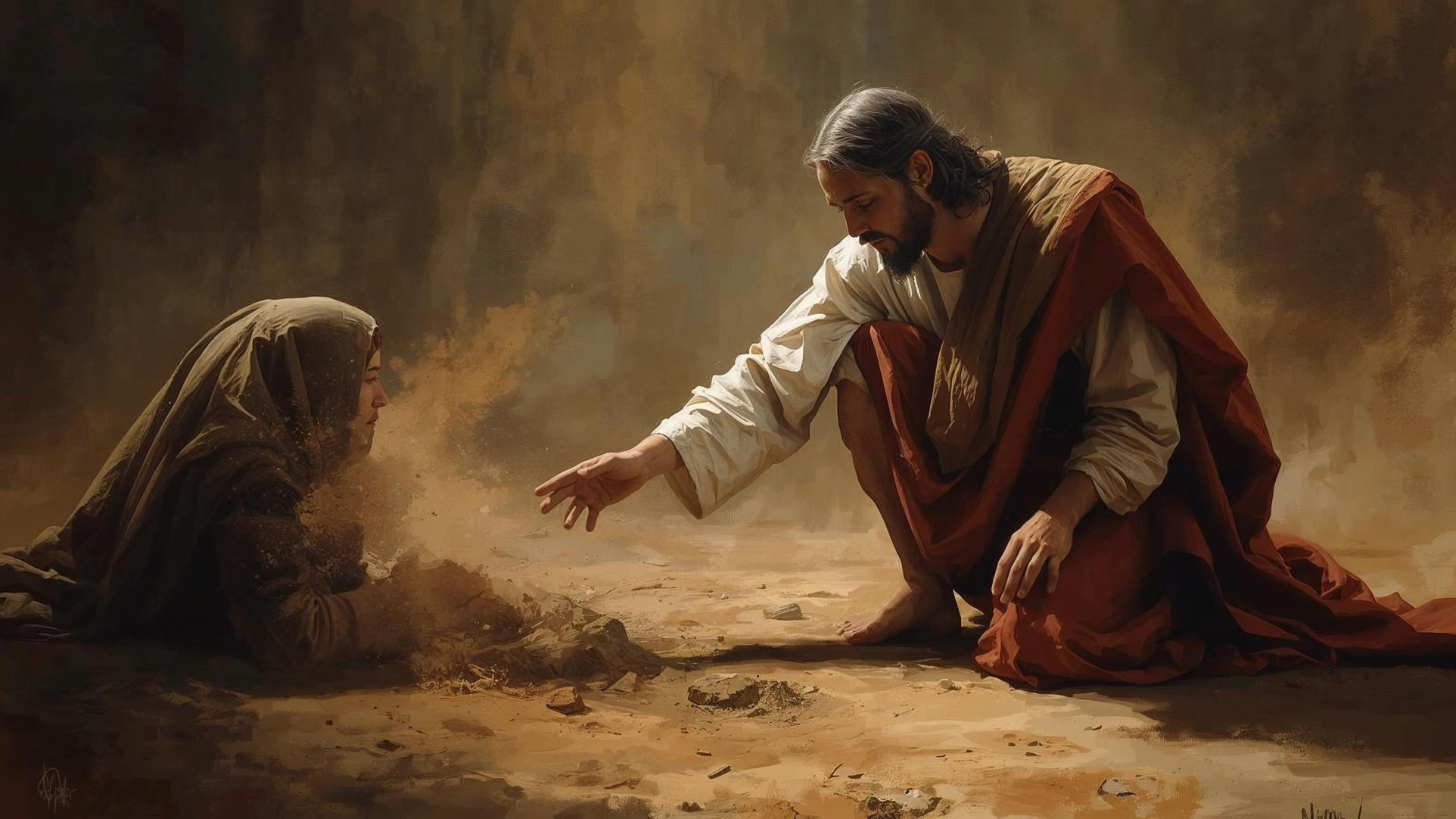"He has not dealt with us according to our sins, nor punished us according to our iniquities. For as the heavens are high above the earth, so great is His mercy toward those who fear Him; as far as the east is from the west, so far has He removed our transgressions from us."
Psalm 103:10–12
Can you hear it? The sound of mercy echoing through the ages: “He has not dealt with us according to our sins … so far has He removed our transgressions from us.” What a reason for thanksgiving!
Early one morning, as the city of Jerusalem began to stir, merchants opened their stalls and organized their wares. Children ran, perhaps playing hide-and-seek. Inside the temple courts, Jesus arrived and sat down to teach. The crowd leaned in, hanging on every word that fell from His lips. Peace rested over the people like a warm sunrise.
Suddenly, that peace shattered.
A group of religious leaders burst into the courtyard, their voices loud, their faces hard. Among them stumbled a woman, quivering, her eyes filled with fear. They thrust her before Jesus, tossing her in full view of everyone.
“Teacher,” spoke a sharp, condemning voice: “this woman was caught in the very act of adultery. The Law of Moses commands us to stone such a woman. What do You say?”
The air grew heavy with tension, judgment, and shame. The men gripped stones, eager to defend their sense of righteousness. They thought they had trapped Jesus. If He showed mercy, they could accuse Him of defying Moses’ law; if He agreed to her death, His compassion would seem false.
Instead of answering, Jesus quietly bent down and began to write on the ground with His finger. The noise hushed. Every eye followed His movement. What did He write?

“The accusers drew nearer, urging the matter upon His attention. But as their eyes, following those of Jesus, fell upon the pavement at His feet, their countenances changed. There, traced before them, were the guilty secrets of their own lives.”1
“Speak, Teacher!” a man demanded.
Inaudibly, Jesus stood and looked at them with calm, steady, piercing eyes. “He who is without sin among you, let him be the first to throw a stone at her."2 Kneeling again, He continued to write in the dust.
Silence—a silence so deep that the thud of each stone tumbling from trembling fingers to the ground echoed in the courtyard. One by one, the accusers slunk away. The crowd that had gathered to witness condemnation, witnessed mercy. The temple courtyard, moments earlier filled with fury, now held only peace—and the sound of grace.
Finally, Jesus faced the woman. Crumpled in a heap, she was still where they had thrown her—head bowed, heart pounding, waiting for judgment.
“Woman,” He queried gently, “where are your accusers? Has no one condemned you?”
She lifted her eyes to meet His: “No one, Lord.”
“Neither do I condemn you. Go, and sin no more.”
As perhaps one of the most dramatic scenarios outside the crucifixion, shouts of accusation turned into the quietness of mercy, of grace. The stones of death had dropped harmlessly to the ground. In the dust where she expected judgment, she met forgiveness.

In the dust of her shame, Jesus stooped to lift her up. This is grace—something to be deeply thankful for. This is mercy—pure, undeserved, life-changing mercy, which Psalm 103 illuminates: “He has not dealt with us according to our sins.”
As we enter this Thanksgiving season, we often thank God for food, family, and blessings we can count. While they are wonderful things, a deeper thanksgiving should fill our hearts—thankfulness for the mercy of God that met us in our guilt and lifted us into His grace.
Jesus Stoops Into the Dust of Our Lives
We have all stood where that woman once stood. Maybe not publicly, maybe not surrounded by crowds—but each of us knows what it means to fall short. Each of us has felt the sting of shame, the weight of failure, the fear that perhaps this time God will finally give up on us. Yet in those very moments, Jesus stoops into the dust of our lives and writes mercy where others would write judgment.
The abundance of His grace is the heart of Thanksgiving—not the abundance on our tables. We give thanks because God does not treat us as we deserve. We give thanks because when we are caught in our own failures, Jesus offers us forgiveness instead of condemnation.
Like that woman, we all have moments when the stones of guilt and regret have weighed heavily on our souls. His forgiveness sweeps away the record of our sin as easily as the wind whips away dust.
In giving thanks, we do not celebrate perfection—but pardon. Not our goodness—but His grace. Not what we’ve earned—but what He freely gives.

Tears of Gratitude
Imagine the woman’s heart as she slipped away from the courtyard that morning. She must have wept tears of gratitude with every step. The stones that could have killed her lay behind, but the mercy that saved her walked beside her. Every sunrise afterward was a reminder: “He has not dealt with me according to my sins.”
And isn’t that our story too? Each of us can say, “If not for the mercy of Jesus, I would still be standing in the dust.”
The same Lord who said, “Go and sin no more,” still speaks today, offering new beginnings to all who meet Him. When others walked away, Jesus stayed. When the world condemned, Jesus forgave.
The woman walked away free—not just free from her accusers, but free from the chains that bound her heart. Every day afterward, her heart may have oozed, “I’m alive because Mercy found me”—this is the heart of Thanksgiving.
As we gather and bow in prayer, let us remember the One who stooped low to lift us up. The One who took our shame and gave us hope. The One who turned our dust into praise. Real thanksgiving begins when we realize how much we’ve been forgiven.
Call to Action
Let us not forget to thank Him—for the mercy that silences condemnation, for grace that gives us another chance, and for love that never lets us go.
Let every grateful heart say, “Thank You, Lord Jesus, for Your mercy in my dust, for Your grace that gave me life, and for Your love that endures forever.”
Do you want to live each day like that forgiven woman—not defined by your dusty past, but thankful for your future because of your Savior’s offering of grace?

Unless noted otherwise, scripture taken from the New King James Version®. Copyright © 1982 by Thomas Nelson. Used by permission. All rights reserved.
- Ellen G. White, The Desire of Ages (Oakland, CA: Pacific Press Publishing Association, 1898), 461.
- New American Standard Bible®, Copyright © 1960, 1971, 1977, 1995, 2020 by The Lockman Foundation. All rights reserved.




